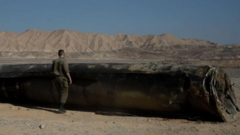The International Atomic Energy Agency (IAEA) has issued a resolution asserting that Iran is in violation of its nuclear nonproliferation obligations, marking a significant moment as it is the first such resolution against Iran in two decades. This vote took place against a backdrop of escalating tensions related to Iran's nuclear ambitions, with U.S. and European officials suspecting that Israel is considering a military strike on Iranian facilities.
Iran Faces Criticism as U.N. Nuclear Monitor Declares Noncompliance

Iran Faces Criticism as U.N. Nuclear Monitor Declares Noncompliance
The International Atomic Energy Agency's recent resolution signals increased tensions and concerns regarding Iran's nuclear program amid heightened geopolitical strife.
The IAEA's board of governors convened in Vienna, where the resolution, led by the U.S., U.K., France, and Germany, received 19 votes from the 35-member board while facing opposition from Russia, China, and Burkina Faso. Eleven nations opted to abstain, indicating a divide in international perspectives on Iran's nuclear activities. The agency highlighted Iran's repeated failure to disclose information about nuclear materials and activities at various unreported sites, raising concerns about the potential for nuclear proliferation.
Iran's leadership condemned the resolution, adamantly threatening to withdraw from the Nuclear Nonproliferation Treaty (NPT) if the situation escalates further. The IAEA’s decision is viewed not just as a rebuke of Iran but also as a piece of the wider diplomatic challenge of negotiating limitations on Iran's nuclear program, which has remained a cornerstone issue for global security.
This declaration by the IAEA could complicate diplomatic relations, making it pivotal for stakeholders to navigate these tensions carefully, while monitoring any potential military responses from Israel or Iran.
As the story develops, observers are urged to stay alert for further updates and implications on the international stage related to the IAEA's findings against Iran.
Iran's leadership condemned the resolution, adamantly threatening to withdraw from the Nuclear Nonproliferation Treaty (NPT) if the situation escalates further. The IAEA’s decision is viewed not just as a rebuke of Iran but also as a piece of the wider diplomatic challenge of negotiating limitations on Iran's nuclear program, which has remained a cornerstone issue for global security.
This declaration by the IAEA could complicate diplomatic relations, making it pivotal for stakeholders to navigate these tensions carefully, while monitoring any potential military responses from Israel or Iran.
As the story develops, observers are urged to stay alert for further updates and implications on the international stage related to the IAEA's findings against Iran.






















